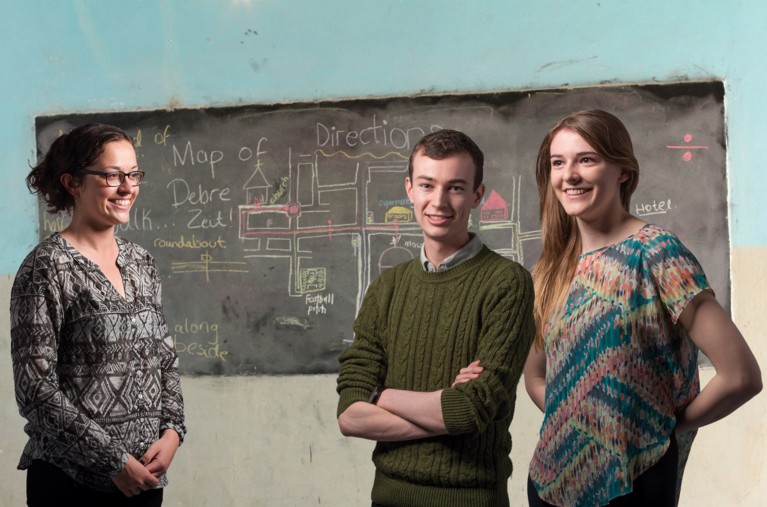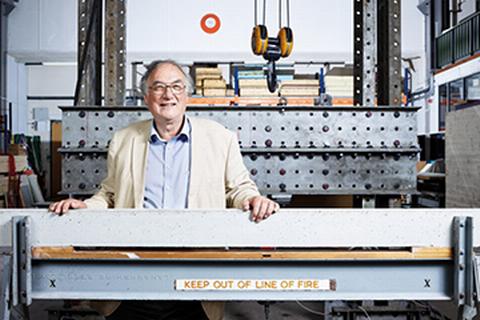Alex, Sam & Tess – Link Ethiopia
Sam, Tess and Alex, three friends in their first year, reading Economics (Sam and Tess) and Classics (Alex), taught English in Debre Zeit, Ethiopia, with support from a local charity called Link Ethiopia.

The organisation strives to support education in Ethiopia and to foster associations between young people in Ethiopia and the UK, through maintaining links between schools in both countries and assisting volunteers like us in Ethiopia itself.
Our arrival in Ethiopia was a little chaotic. We arrived in Addis Ababa at midnight and waited in the airport until morning for our transfer to Debre Zeit, about 40 km to the south. With no spare seats, we positioned ourselves against a 30 foot-high wall of lost luggage, ready for a long wait. Three hours in, with Tess and Alex sound asleep, we experienced our first power cut of many in Ethiopia. The easygoing attitude of Ethiopian people was immediately impressed upon us by seeing how unfazed the airport staff and locals were by the sudden plunge into darkness.
Ethiopia is situated close to the equator and so the length of its days does not vary significantly. As a result, it has adopted an interesting timing system that took us a while to become accustomed to. The days start at 00:00 when the sun rises (6am) and end when it sets at 12:00 (6pm), meaning we were to be at school by 02:00, which felt very strange!
September is a very colourful month in Ethiopia, with the end of the rainy season leaving the countryside vividly green. It is also colourful because of its festivities. New Year’s Day falls in September as Ethiopia maintains the Julian 13-month calendar, putting it seven years behind the rest of the world. We welcomed in 2006 for the second time in our lives!
September marks the beginning of the new academic year, but unlike Britain the exact starting dates are vague. This enabled us to lead our own summer-school classes. We taught a small group of around 20 students, all girls aged 12 and 13 and all very enthusiastic: we taught a full class in the morning at Lemlem Tesfa school and in the afternoon led a smaller group of children, sponsored by Link Ethiopia’s supporters in the UK, at the Link’s office where we were based.
Teaching in Ethiopia is geared very much towards rote learning: a teacher writing on the board or dictating with pupils copying. We wanted to bring our own experience of more diverse and exciting teaching to encourage as much conversation in English as possible. We spent a lot of time playing games that soon became favourites, including ‘Simon Says’ and ‘Stop the Bus’, along with traditional Ethiopian games such as ‘Big Beauty, Big Beauty’.
Link Ethiopia had told us that the children love discussing complex issues and engaging in debate. We were unsure at what level they’d respond, but introduced conversation on ‘the role of women in society’. We were amazed at the level of sophistication, maturity and awareness with which they spoke about the topic in English. Concepts that were brought up included it being ‘controversial’, involving ‘equal opportunities’ and ‘financial independence’.
Official lessons finally started in our last week. There were up to 60 students in each class, so we were very relieved to hear we would only be observing the English class on Monday morning. However, after we had sat down at the back to await the teacher’s arrival, a pupil turned round and asked when we were going to start the lesson! That was a shock and a bit daunting at first, but we quickly found our feet and managed to control and engage such a large number of students. The majority were keen to chat and to compare themselves with our very different upbringings, though just like in any classroom there were the typical grumpy teenagers, who took a little longer to warm to us.
As we only taught on weekdays, we managed to fill the rest of our time with travelling to experience the vast scenery, culture, food, history and wildlife that Ethiopia has to offer. We took a trip to the country’s capital, Addis Ababa, and visited the National Museum where we saw the exhibition of Lucy, a human ancestor who lived 3.2 million years ago. We also visited the Bale Mountains, staying in a lodge in the National Park where warthogs, bushbuck and other wildlife would routinely stare into our window, and catching a glimpse of the endangered Ethiopian wolf.
We are grateful for the financial support that Emmanuel has offered, as the trip wouldn’t have been possible without it. Not only did we find out much about a beautiful country and fascinating culture, but we also learned a lot about teaching in variable circumstances and hope to have imparted enthusiasm for education to the inspiring young people we met. All three of us are continuing to work with Link Ethiopia through Emmanuel’s SAFE (Southern African Fund for Education) Committee and hope to remember the lessons we ourselves learned in Ethiopia, thanks to Emmanuel’s support.


